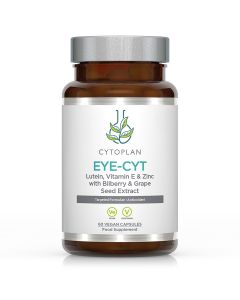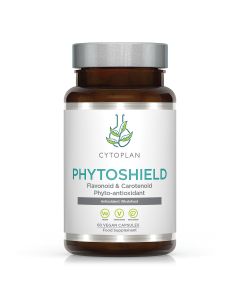More than just a pretty pigment: 3 suprising benefits of carotenoids for your skin & eyes
What are Carotenoids?
Carotenoids are a class of more than 750 naturally occurring phytonutrients, synthesised by plants, algae and some fungi and bacteria. These richly coloured pigments give colour to the yellow, orange and red of many plant foods – with fruit and vegetables providing most of the 40-50 carotenoids found in the human diet.
Carotenoids all play a protective role against oxidative damage and help to support our natural antioxidant defence system, which can help to protect against a range of chronic illnesses. Some carotenoids, such as beta-carotene are "provitamin A” compounds, which means they are converted into vitamin A by the body. But other carotenoids, such as lutein, zeaxanthin and lycopene have no vitamin A activity once consumed.
As mentioned, carotenoids play a protective role for many areas of health. These include promoting eye, skin, and cardiovascular health and supporting immunity, cognitive function, and bone health… but let’s have a closer look at how these powerful plant nutrients work to support our eye and skin health.
Carotenoids and Eye Health
Lutein and Zeaxanthin
These two carotenoids are the only two that are found in the retina and lens of the human eye, which is why they are accredited with improving eye health and protecting vision. There is a wealth of studies that demonstrate their benefits to eye health, including protecting the eyes from the effects of prolonged screen time, by absorbing up to 90% of the blue light the eye is exposed to, protecting the retina from light-related damage. Several studies have also demonstrated the protective role of lutein and zeaxanthin against conditions such as age-related macular degeneration (ARMD).
Great dietary sources include:
-
Dark leafy greens such as kale and spinach
-
Parsley
-
Peas
-
Squash
-
Brussels sprouts
-
Pistachios
-
Egg yolks
-
Broccoli
-
Pumpkin
-
Cantaloupe
-
Corn Orange
Beta-Carotene
As mentioned, beta-carotene gets converted into Vitamin A in the body, and is, in fact the primary source of vitamin A in the human diet. Vitamin A is crucial for eye health, particularly for vision in low light conditions and maintaining the health of the cornea (the protective outer layer of the eye). Vitamin A helps the body produce pigments in the retina, which are essential for proper vision, especially in dim light. A deficiency in vitamin A can lead to night blindness and is often implicated in dry eye.
Great dietary sources include:
-
Dark leafy greens such as kale and spinach
-
Sweet potatoes
- Carrots
- Butternut squash
- Cantaloupe melon
- Red/yellow/orange peppers
- Apricots
- Spices such as paprika, chilli and cayenne
- Herbs such as parsley, coriander and sage
Carotenoids and Skin Health
In the human skin, there is a high concentration of carotenoids in the epidermis (the outermost layer), where they act as a protective barrier to various environmental influences, such as ultraviolet radiation and air pollution, that cause oxidative stress within the skin. These environmental factors can contribute to sunburn, DNA damage and premature ageing in the skin. Carotenoids, particularly beta-carotene, lycopene, lutein, and astaxanthin offer protection to the skin not only through direct light-absorbing properties, but also through their antioxidant effects.
Collagen, the primary structural protein in the body, declines with age leading to a loss of skin elasticity, a hallmark of ageing skin. Several factors contribute to collagen degradation, including environmental factors such as UV radiation, smoking, poor diet, and chronic stress. Carotenoids in the skin can neutralise the reactive oxygen species, potentially reducing the oxidative damage to collagen. People who have higher levels of carotenoids and other antioxidants in their tissues tend to experience less premature skin ageing - so you really can eat your way to healthy skin!
As well as being incredibly important for eye health, beta-carotene has a profound photoprotective effect in the skin. Other carotenoids noted for their roles in skin health include:
Lycopene
Among the carotenoids, lycopene has the highest antioxidant efficiency, and its ability to reduce both oxidative stress and inflammation suggest a protective role against a range of age-related diseases. Supplementing with lycopene has shown to significantly improve skin barrier function, whilst improving visual appearance of lines and wrinkles, skin tonality, pores, smoothness, and firmnessiv.
Great food sources include;
-
Tomatoes (particularly sundried or tomato sauces)
-
Pink guava
-
Apricot
-
Watermelon
-
Papaya
Astaxanthin
The primary sources of astaxanthin include:
-
Wild-caught sockeye salmon
-
Krill
-
Red trout
-
Lobster
-
Crab
-
Shrimp
-
…and the algae that feed them.
Flamingos actually get their pink colour from the astaxanthin found in shrimp and algae!
Did you know?
-
Carotenoids are fat soluble, which means they are best absorbed when taken with fats. So that drizzle of olive oil on your salad, or knob of butter on your steamed veggies will be doing more than just making your meals delicious!
-
Unlike most vitamins and minerals, cooking and chopping carotenoid-rich foods increase the strength of the nutrients when they enter the bloodstream. In fact, cooked tomatoes have up to around a whopping 170% more lycopene than raw tomatoes!
-
Provitamin A carotenoids, such as beta-carotene are converted into vitamin A in the liver and intestines at levels of need. This is because the human body has a mechanism in place that will stop the conversion when vitamin A levels are adequate in the body, therefore preventing vitamin A toxicity.












